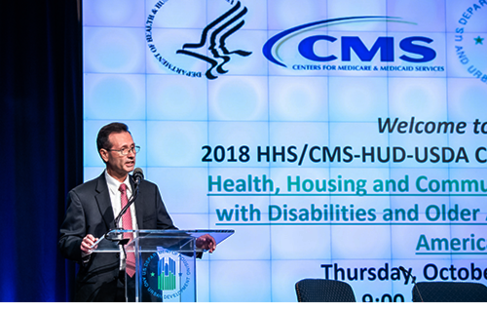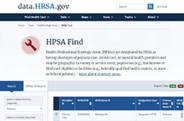
 |
Dr. George Sigounas, HRSA Administrator, addressed a joint meeting on October 11 of Social Security, Housing and Agriculture Department officials seeking to better coordinate efforts to serve people with disabilities and older adults living in rural America. Dr. Sigounas noted that HRSA is at the leading edge of the Administration’s drive to increase the rural healthcare workforce, provide opioid treatment and extend telehealth care delivery to remote regions of the country.
Supporting Families Impacted by Opioid Use and Neonatal Abstinence Syndrome

HRSA has released a new resource for Maternal, Infant, and Early Childhood Home Visiting Program awardees and their state partners in early childhood, public health, and substance misuse and mental health treatment. It provides essential information about the opioid epidemic, opioid use disorder, and neonatal abstinence syndrome.
It includes relevant research; offers strategies; and highlights promising efforts underway in Maine, Colorado, West Virginia, and Massachusetts.
Read the full resource (PDF - 451 KB).
|
National Rural Health Day

On November 15th, the Federal Office of Rural Health Policy will join the National Organization of State Offices of Rural Health to celebrate National Rural Health Day.
Events throughout the week, open to the public and viewable online, will showcase collaboration for rural health across HRSA’s bureaus and offices as well as other departments within HHS.
HRSA is hosting a Rural Health Day Twitter chat on the role of Telehealth. Throughout the chat, we will discuss how the use of telehealth can help health care and accessibility in rural areas across the nation. Join us by using the hashtag #TalkTelehealth
View the National Rural Health Day agenda.
Follow us on Twitter and join our Twitter chat on November 15 at 2:00 pm ET.
|
HRSA Releases Dear Colleague Letter on the Importance of Viral Suppression Messaging

HRSA-funded Ryan White HIV/AIDS Program (RWHAP) providers discuss important information with their patients, including details about viral suppression. To support these discussions, HRSA released a Dear Colleague Letter on October 19 outlining recommendations for RWHAP recipients and subrecipients as they incorporate messages about the impact of viral suppression.
In 2016, 84.9 percent of RWHAP clients receiving HIV medical care were virally suppressed. Providers and stakeholders play a critical role in reaching the audiences that need to be linked to care, retained in care, and supported in adhering to their HIV medication.
Several large studies have demonstrated that people living with HIV who have consistent viral suppression do not sexually transmit HIV. HRSA strongly encourages RWHAP providers and stakeholders to leverage their expertise and program infrastructure to incorporate viral suppression messaging in service delivery settings where people living with HIV are engaged.
Read the Dear Colleague Letter (PDF - 390 KB).
|
HRSA’s HIV/AIDS Bureau Releases Updates to Policy Clarification Notice #16-02
HRSA's HIV/AIDS Bureau (HAB) released an update to Policy Clarification Notice (PCN) #16-02 Ryan White HIV/AIDS Program Services: Eligible Individuals and Allowable Uses of Funds. The updated PCN provides additional clarifications to a limited number of service categories and further reduces administrative burden by replacing PCN #12-01 The Use of Ryan White HIV/AIDS Program Funds for Outreach Services.
Read the Policy Clarification Notice (PDF - 168 KB).
Rural Health: A Glimpse of the Future

HRSA's Federal Office of Rural Health Policy (FORHP) hosted a 3-day telehealth technology showcase at HRSA headquarters in October.
"Five hundred and twenty-three of the 1,300-plus community health centers ... are using telehealth in some way, shape or fashion. And we think that's a great start. Obviously, we want to expand that ... But I think there's more interest in the health center world in doing more in telehealth, and I think that's true across HRSA," said Tom Morris, FORHP Associate Administrator.
|
Deadline Extended for the Care Coordination for CSHCN Challenge

The deadline for submitting your Phase 1 application to the Care Coordination for Children with Special Health Care Needs (CSHCN) Challenge has been extended. Your solution is now due by Friday, November 9 at 8:00 p.m. ET.
You need only a 5-page description of your innovative idea that meets the Submission Requirements and Review Criteria. This challenge supports the creation of technology innovations to meet the needs of children with special health care needs and their families.
Learn about the MCHB Grand Challenges and submit your proposed innovationtoday.
|
HRSA Data Reveal Latest National and State Obesity Rates, Youth Ages 10-17

A study using HRSA data revealed that Mississippi has the highest youth obesity rate at 26.1 percent, above the national rate of 15.8 percent. Utah has the lowest rate at 8.7 percent. While the national obesity rate for youth remained statistically the same since last year, North Dakota was the only state to experience a significant change in youth obesity, from 15.8 percent down to 12.5 percent. The study analyzed 2016 and 2017 data from HRSA’s National Survey of Children’s Health.
The data also showed differences in national obesity rates by race and ethnicity. Black youth had the highest rate, at 22.5 percent, followed by Hispanic youth at 20.6 percent, White youth at 12.5 percent, and Asian youth at 6.4 percent. Scientists predict that more than half of today’s youth will be obese by age 35 if current trends continue.
Read the Issue Brief at State of Obesity (PDF - 440 KB).
|
Updated “HPSA Find” tool on data.hrsa.gov

Try out the new and improved HPSA Find tool for exploring Health Professional Shortage Areas (HPSA). Search instantly by state, county, HPSA ID and filter results in a handy data grid or export results to a file.
Designed with the user in mind, this version is more intuitive, interactive and useful. We welcome your feedback at data@hrsa.gov.
|
Webinar: Screening, Symptom Recognition & Referral to Treatment for Eating Disorders in Pediatric Primary Care Settings

Date: Tuesday, November 6Time: 2:00 p.m. – 3:00 p.m. ET
Effective treatments for a range of eating disorders (EDs) are well established, yet the majority of those who struggle with an ED never receive treatment. In recent years, there has been a growing call for clinical training for pediatric primary care providers focused on how to recognize the signs and symptoms of eating disorders in children, adolescents, and young adults, as well as how to perform screening and appropriately refer patients to specialized care. To answer this call, the HHS Office on Women’s Health is offering a new online clinical education program developed by the Strategic Training Initiative for the Prevention of Eating Disorders, based at Boston Children’s Hospital and the Harvard T.H. Chan School of Public Health, in partnership with the Eating Disorders Coalition.
Several resources for health care providers will also be provided, including a demonstration of an online interactive tool to identify local eating disorders specialists. Register for the free webinar and e-Course.
If you have any questions or need information about receiving CEUs through participation in an archived session, please contact Erin Gibson at erin.gibson@childrens.harvard.
|





















.png)









No hay comentarios:
Publicar un comentario